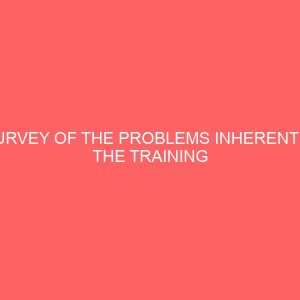Description
TRAINING AS AN EFFECTIVE TOOL FOR SECRETARIES LEVEL OF PERFORMANCE IN INFORMATION AND COMMUNICATION TECHNOLOGY(ICT)
ABSTRACT
This project work is aimed at examining the training secretaries as an effective tool in information and Communication Technology in every organization.
Training can simply be defined as the ability to achieve a particular skill or knowledge to do a particular job, while information and communication technology on the other hand is the study of use of electronic equipment for storing or analysis information. It is the bedrock for national survival and development of rapidly changing global environment. The prospective and present secretaries should be given training within and outside the country and adequate financial support should be given to them in the course of their training.
CHAPTER ONE
1.0 INTRODUCTION
The vital role of training secretaries in an organization and its effect on Information and Communication Technology cannot be over-emphasized.
It is importance for organization to create an easily adapted labour force in this time of technological changes by systematic training so long as secretaries are used to obtain organization goals, they should be given proper training as an effective tool in information and communication in order to make them productive.
The fundamental goal of any personnel policy is to obtain maximum utilization with the firm of the potential ability to each individual worker. To achieve this goal, a sound training in this information and communication technology programme is mandatory.
With this goal in mind, the training manager with the assistance of heads of other departments should plan the training on information and communication technology programmed for categories of secretaries. Individual acquire one type of training or the other right from the beginning the first training which a child receives is from the parent, the society and formal education setting.
Training is to help employees to contribute their maximum usefulness to the firm at the shortest possible time, so it is something that is done once for new employee, it should be a continuous process in every organization and in the life of every individuals.
Training is directed towards changing the behaviour of attitude of an individual to achieve an acceptable rescue and she must also retain in information technology so as enable her meet the satisfaction of her employer. The numerous benefits which the employees derived from training cannot be over-emphasized. Money spent alone in training is money well invested.
Information technology is the bedrock for national survival and development in a rapidly hanging global environment and challenges us to devise bold and courageous initiatives. Without technology Nigeria would have still be in the dark, not knowing what s going on in other developed countries the growing use of Information and Communication Technology (ICT) worldwide has resulted in increasing awareness of the critical role that information play in supporting the development process.
Training of secretaries in information technology makes them skillful in their profession and has a wider general knowledge of techniques, which may be required in the future to meet anticipated future needs organization.
1.1 STATEMENT OF THE PROBLEM
Every organization adopts different strategies towards improving, the skill of their employees on technological problems in order to ensure effective realization of the organization goal.
Meanwhile, one of the strategies of improving human skills in an organization is through training but it is painful that most of the well-known organization in the country do not lay much emphasis on training of their employees on the new techniques and the resulted in low productivity as well as low profit.
On the other hand, it is also noted that few of the organization that train staff fail to adapt appropriate technique in carrying out training programme for their employees and consequence of this led to poor performance on the part of the employees and wastage of money the might have been spent in training such. It is also observed that technological equipment needs to be carried out by organization to their employees are not done accordingly and this lead to de-moral of workers and consequently leads to poor productivity.








Reviews
There are no reviews yet.